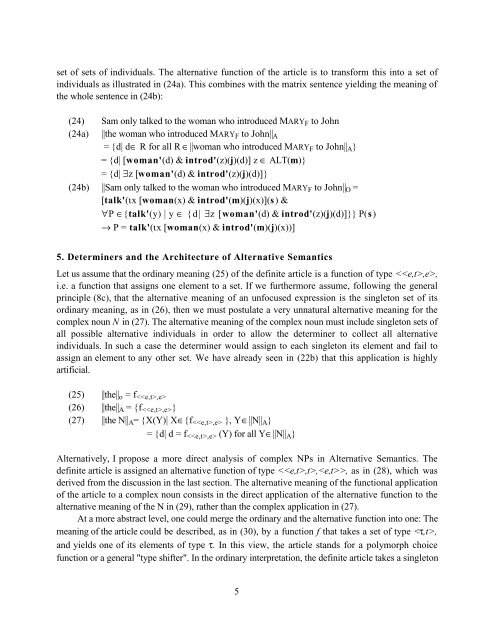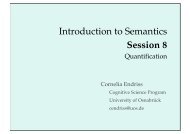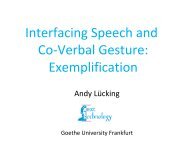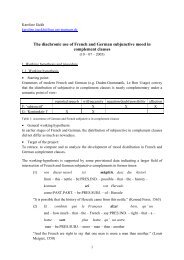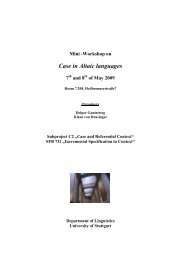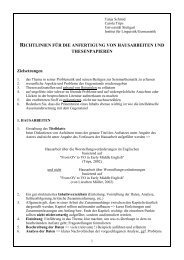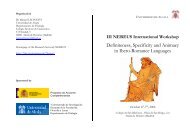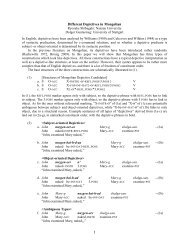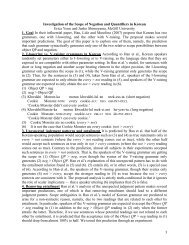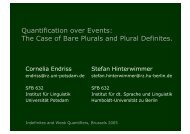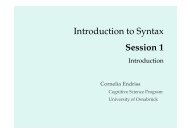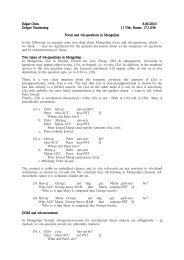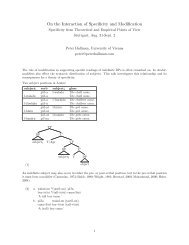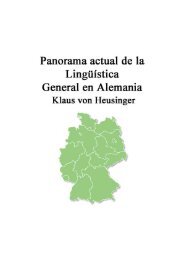Focus in complex noun phrases
Focus in complex noun phrases
Focus in complex noun phrases
You also want an ePaper? Increase the reach of your titles
YUMPU automatically turns print PDFs into web optimized ePapers that Google loves.
set of sets of <strong>in</strong>dividuals. The alternative function of the article is to transform this <strong>in</strong>to a set of<br />
<strong>in</strong>dividuals as illustrated <strong>in</strong> (24a). This comb<strong>in</strong>es with the matrix sentence yield<strong>in</strong>g the mean<strong>in</strong>g of<br />
the whole sentence <strong>in</strong> (24b):<br />
(24) Sam only talked to the woman who <strong>in</strong>troduced MARY F to John<br />
(24a) ||the woman who <strong>in</strong>troduced MARY F to John|| A<br />
= {d| d∈ R for all R ∈||woman who <strong>in</strong>troduced MARY F to John|| A }<br />
= {d| [woman'(d) & <strong>in</strong>trod'(z)(j)(d)] z ∈ ALT(m)}<br />
= {d| ∃z [woman'(d) & <strong>in</strong>trod'(z)(j)(d)]}<br />
(24b) ||Sam only talked to the woman who <strong>in</strong>troduced MARY F to John|| O =<br />
[talk'(ιx [woman(x) & <strong>in</strong>trod'(m)(j)(x)](s) &<br />
∀P ∈{talk'(y) | y ∈ {d| ∃z [woman'(d) & <strong>in</strong>trod'(z)(j)(d)]}} P(s)<br />
→ P = talk'(ιx [woman(x) & <strong>in</strong>trod'(m)(j)(x))]<br />
5. Determ<strong>in</strong>ers and the Architecture of Alternative Semantics<br />
Let us assume that the ord<strong>in</strong>ary mean<strong>in</strong>g (25) of the def<strong>in</strong>ite article is a function of type ,<br />
i.e. a function that assigns one element to a set. If we furthermore assume, follow<strong>in</strong>g the general<br />
pr<strong>in</strong>ciple (8c), that the alternative mean<strong>in</strong>g of an unfocused expression is the s<strong>in</strong>gleton set of its<br />
ord<strong>in</strong>ary mean<strong>in</strong>g, as <strong>in</strong> (26), then we must postulate a very unnatural alternative mean<strong>in</strong>g for the<br />
<strong>complex</strong> <strong>noun</strong> N <strong>in</strong> (27). The alternative mean<strong>in</strong>g of the <strong>complex</strong> <strong>noun</strong> must <strong>in</strong>clude s<strong>in</strong>gleton sets of<br />
all possible alternative <strong>in</strong>dividuals <strong>in</strong> order to allow the determ<strong>in</strong>er to collect all alternative<br />
<strong>in</strong>dividuals. In such a case the determ<strong>in</strong>er would assign to each s<strong>in</strong>gleton its element and fail to<br />
assign an element to any other set. We have already seen <strong>in</strong> (22b) that this application is highly<br />
artificial.<br />
(25) ||the|| o = f <br />
(26) ||the|| A = {f }<br />
(27) ||the N|| A = {X(Y)| X∈{f }, Y∈||N|| A }<br />
= {d| d = f (Y) for all Y∈||N|| A }<br />
Alternatively, I propose a more direct analysis of <strong>complex</strong> NPs <strong>in</strong> Alternative Semantics. The<br />
def<strong>in</strong>ite article is assigned an alternative function of type ,>, as <strong>in</strong> (28), which was<br />
derived from the discussion <strong>in</strong> the last section. The alternative mean<strong>in</strong>g of the functional application<br />
of the article to a <strong>complex</strong> <strong>noun</strong> consists <strong>in</strong> the direct application of the alternative function to the<br />
alternative mean<strong>in</strong>g of the N <strong>in</strong> (29), rather than the <strong>complex</strong> application <strong>in</strong> (27).<br />
At a more abstract level, one could merge the ord<strong>in</strong>ary and the alternative function <strong>in</strong>to one: The<br />
mean<strong>in</strong>g of the article could be described, as <strong>in</strong> (30), by a function f that takes a set of type ,<br />
and yields one of its elements of type τ. In this view, the article stands for a polymorph choice<br />
function or a general "type shifter". In the ord<strong>in</strong>ary <strong>in</strong>terpretation, the def<strong>in</strong>ite article takes a s<strong>in</strong>gleton<br />
5


